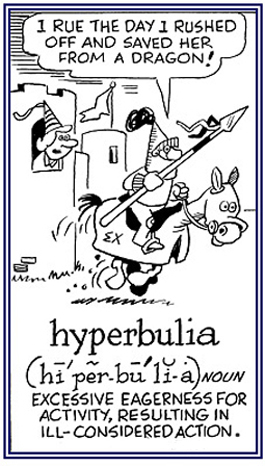hyper-, hyp-
(Greek: above, over; excessive; more than normal; abnormal excess [in medicine]; abnormally great or powerful sensation [in physical or pathological terms]; highest [in chemical compounds])
2. An instance of hyperbole or an exaggerated statement.
2. In rhetoric or speaking, amplification; a representation of things beyond the truth; hyperbolical representation, whether of good or evil.
3. In painting, a method of giving a representation of things too strong for the life.
2. The act of representing things beyond natural life, in expression, beauty, power, or vigor.
2. Overstating, or describing, something that is more than what is factual.

Go to this Word A Day Revisited Index
so you can see more of Mickey Bach's cartoons.
2. An abnormally increased arterial carbon dioxide tension as a result of hypoventilation; hypercarbia.
The air was heated by a furnace (outside the rooms) and once it had circulated underneath the flagstone floors, it escaped via flues in the walls of the rooms, or spaces in the walls, for heat to travel upward.
Colchester: Roman heating system found
Evidence of Roman central heating was found by archaeologists digging at the site of the old Head Street Post Office.
The heating system, called a "channelled hypercaust", was unearthed by diggers working on the site for the Colchester Archaeological Trust.
It proves that nearly 2000 years ago, Roman citizens of Colchester were warming their toes (trouble-free) in the coldest of winters.Archaeologists were taking out a lot of material from the destruction of the town by Boudica which included the remains of walls and foundations.
The whole site was being converted into a cinema, but must be investigated first because it sat in the center of Britain's oldest recorded town.
The hypercaust central heating is believed to have serviced a large town house room over ten meters long
It was thought to be part of the same building as a bath complex found earlier at the site and worked by drawing hot air from a fire under the floors of the buildings.
The heat was transferred to the floor and could be felt in the room. It was a dirt and smoke-free method of heating a room long before electricity.
Related "above, over, beyond the normal, excessive" word units: epi-; super-, supra-, sur; ultra-, ult-.
Inter-related cross references, directly or indirectly, involving word units meaning "more, plentiful, fullness, excessive, over flowing": copi-; exuber-; multi-; opulen-; ple-; pleio-; plethor-; poly-; super-; total-; ultra-; undu-.


